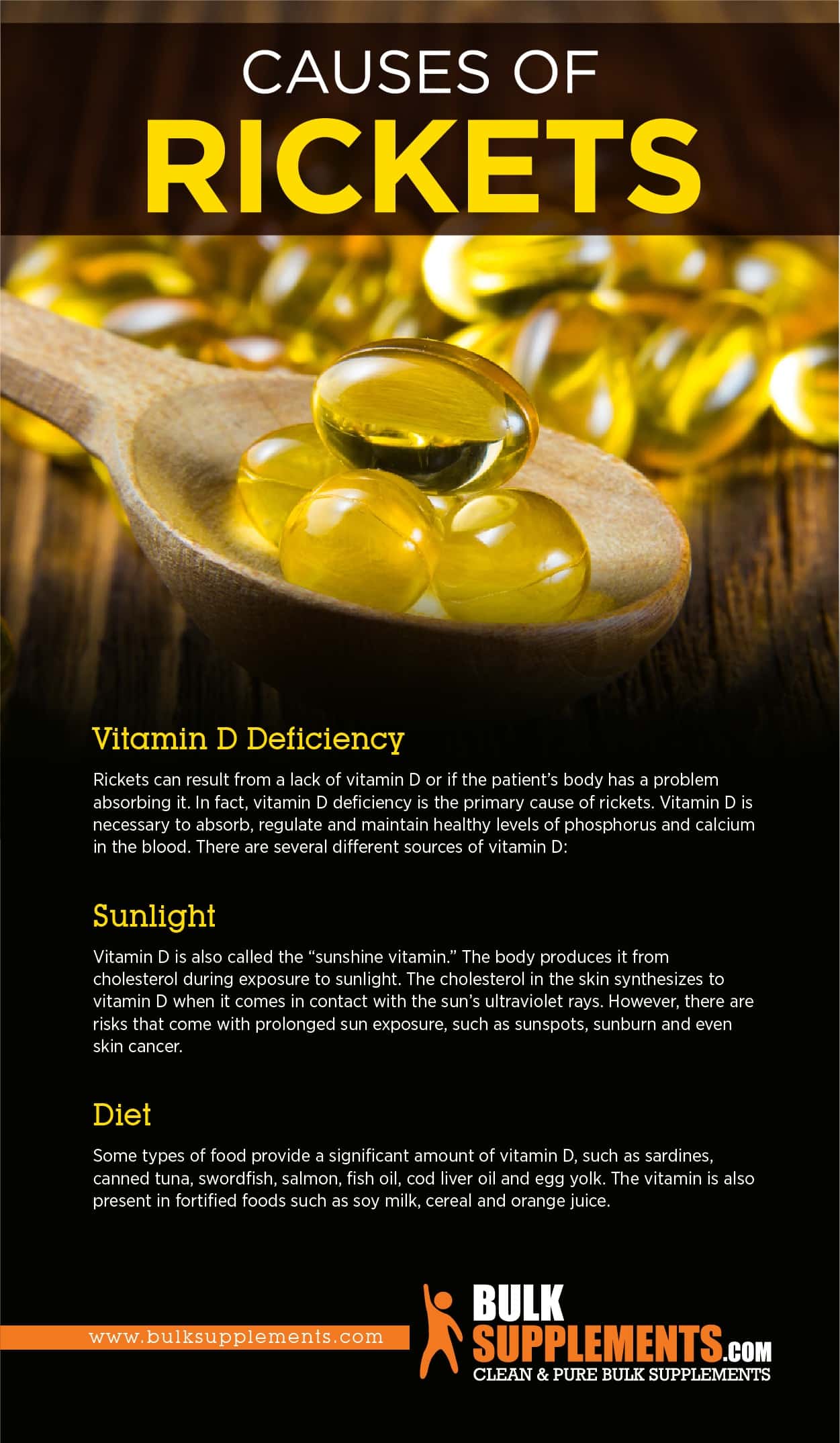What is Rickets?
Rickets is a condition in which the bones in the body are soft, weak, deformed or stunted. This disease is caused by vitamin D, phosphorus and calcium insufficiency in the bones. These minerals are necessary to make the bones strong and healthy (x).
Vitamin D is an essential nutrient that helps the body absorb phosphate and calcium (x). When children have Vitamin D deficiency, it is difficult for their bodies to absorb the phosphate and calcium that the bones need. As a result, the body will produce hormones that release these substances instead, making the bones soft and weak. This disease is more common in children between 6 and 36 months old because this is the phase in which the bones are still growing and developing (x).
Making sure that a child gets sufficient vitamin D and calcium can help prevent rickets. In some infants, breast milk alone does not provide enough vitamin D and they may need supplements with permission from a doctor (x). Vitamin D can be derived from different natural sources as well. One of the most common and accessible is sunlight. Food like eggs, fish and milk are also good sources of this mineral.
Symptoms of Rickets
Rickets may cause the following physical signs and symptoms (x):
- Delayed growth
- Delayed motor skills like walking and crawling
- Back pain
- Pelvic pain
- Leg pain
- Easier risk for bone breaks
- Weak muscles
- Slow dental development, soft enamel or deformed teeth
- Soft spots in infants, mostly on the forehead
Skeletal deformities are also possible because rickets can soften the ends of growth plates that contain the growing tissues. It can cause the following:
- Projected breastbone
- Thick wrists and ankles
- Bowed legs or knocked knees
- Scoliosis, a curve in the spine
- Kyphosis, a hunched back
- Abnormally shaped skull
Rickets Causes
Patients develop rickets from a deficiency in vitamin D, calcium or phosphate, all of which are responsible for strengthening the bones.
Vitamin D Deficiency
Rickets can result from a lack of vitamin D or if the patient’s body has a problem absorbing it. In fact, vitamin D deficiency is the primary cause of rickets. Vitamin D is necessary to absorb, regulate and maintain healthy levels of phosphorus and calcium in the blood (x). There are several different sources of vitamin D:
Sunlight
Vitamin D is also called the “sunshine vitamin.” The body produces it from cholesterol during exposure to sunlight. The cholesterol in the skin synthesizes to vitamin D when it comes in contact with the sun’s ultraviolet rays. However, there are risks that come with prolonged sun exposure, such as sunspots, sunburn and even skin cancer (x).
Diet
Some types of food provide a significant amount of vitamin D, such as sardines, canned tuna, swordfish, salmon, fish oil, cod liver oil and egg yolk. The vitamin is also present in fortified foods such as soy milk, cereal and orange juice (x).

Other Associated Conditions
Celiac Disease
Celiac disease is a digestive disease in which the intestine reacts with gluten including barley, rye or wheat. It can cause diarrhea, bloating, stomach pain or weight loss (x). According to research, rickets may be the first or even the only indication of celiac disease because the nutritional malabsorption that the condition causes puts patients at risk for bone damage (x).
Inflammatory Bowel Disease
Inflammatory bowel diseases (IBD) are conditions characterized by chronic inflammation in the digestive tract. The two main types are Crohn’s disease and ulcerative colitis. Symptoms may include pain and cramps, dehydration, nausea, watery diarrhea and fever. Researchers state that vitamin D may play a role supporting digestion in the body and suggest a connection between IBD and vitamin D deficiency (x).
Cystic Fibrosis
Cystic fibrosis is a genetic disease that affects the lungs and the digestive system. It causes very thick and sticky mucus to develop and blocks the lungs and pancreas. It causes frequent infections, inflammation and respiratory failure. In the pancreas, it interferes with digestive enzymes that help absorb food and nutrients. It may also increase the risk for vitamin D malabsorption (x, x).
Kidney Disease
In some cases, rickets may be a result of underlying kidney problems since the organ is responsible for regulating acid balance in the body. The bones rely on phosphorus for strength and structure and kidney damage can interfere. In some cases it is related to renal problems, such as renal tubular acidosis (x).
Risk Factors
There are several factors that may increase the risk of a patient developing rickets, such as:
Premature Birth
Premature babies may be more prone to developing rickets if they are born before the bones develop fully. Premature birth may not allow the infant to absorb all the essential vitamins that baby’s body needs inside the womb, including Vitamin D (x).
Pregnancy
If a patient has vitamin D deficiency during pregnancy, it may increase the risk for deficiency in the infant. The infant can develop rickets if they do not absorb enough minerals from the mother during gestation. As a result, the infant may show signs of rickets after birth (x).
Geography
Geographic location may also affect whether a patient develops rickets. For example, locations in northern climates may receive less sunlight, so patients do not receive as much natural vitamin D from the sun (x).
Breastfeeding
In some cases, exclusively breastfeeding may increase the risk for rickets. Sometimes breast milk does not contain enough vitamin D to keep the infant’s bones strong and potentially cause a deficiency that may lead to rickets (x).
Treatment for Rickets
Rickets treatment depends on the underlying cause. Physicians aim to relieve the symptoms and treat the cause so that the condition does not return. Patients need to increase their calcium, vitamin D and phosphorus intake and in most cases that will help get rid of the symptoms. Patients can replace the insufficient vitamins with dietary sources like milk and fish liver. Physicians may also recommend moderate sun exposure. However, patients should be cautious with sun exposure and take measures to protect the skin from damage (x).
Patients suffering from rickets due to genetic causes may need phosphorus medications and active vitamin D hormones. If an underlying kidney condition is the cause, physicians will need to address that condition first. In some cases, patients may require corrective surgery or braces to reposition the bones correctly. This may reduce or prevent skeletal deformities (x).
Possible Complications
If the patient doesn’t receive treatment for rickets, they may be at risk for easier bone fractures and skeletal deformities. Sometimes the bones may even fracture without a cause. If the patient is a child and receives treatment while they are still growing, deformities may not be permanent and they may improve eventually. In the long-term, rickets may cause permanently short stature and chronic, long-lasting pain (x).
Other complications include seizures, breathing problems and heart problems from calcium deficiency (x). It may also cause problems with the patient’s teeth. When the body does not have enough calcium, it can delay tooth development, weaken the teeth and roots or cause irritation in the gums (x).
Supplements for Bone Strength
Patients may also be able to help increase bone strength with dietary vitamins and minerals. However, supplements are not a treatment for rickets or any other condition. Always consult a doctor before taking any supplements.
Vitamin D
Some of the most effective ways to increase vitamin D intake is sun exposure or diet. However, there are risks to long periods of sun exposure, such as an increased risk for skin cancer and other forms of sun damage. Vitamin D is essential to bone health and the body produces it naturally when the skin is exposed to sunlight. It is also present in some foods. But if patients cannot get enough of it from diet or the environment, they may opt for dietary supplements.
The recommended dosage for vitamin D3 is 50 mg per day. Always consult a doctor before taking this supplement. Measure the supplement very carefully using a precise milligram scale.
Calcium
Calcium is another important mineral that the body needs to strengthen the bones and teeth. But unlike vitamin D, the body cannot make it on its own, so patients need it through their diets or with supplements. The recommended dosage for calcium citrate powder is 2,380 mg once or twice a day with meals, after consulting a physician for safety.
Magnesium
The body needs sufficient amounts of magnesium in order to absorb calcium and vitamin D. Magnesium converts vitamin D into its active form to help absorb calcium in the bones and other parts of the body. The recommended dosage for magnesium citrate supplements is 440 mg per day, if a doctor approves the dosage.
The Bottom Line
Rickets is a disease most common among infants and young children. It causes weak and soft bones and results from a lack of vitamin D, calcium or phosphorus in the body. Each of these is important for maintaining bone strength. Vitamin D is an essential mineral in the body to absorb phosphorus and calcium into the bones and the blood. The body naturally produces vitamin D when the skin is exposed to the sun and it is present in food sources like milk, sardines, tuna and fish oil.
Symptoms include weak bones, skeletal deformity, delayed skeletal development, bowed legs and an abnormally shaped skull. Without treatment, patients with rickets may also experience dental problems, a soft spot on the infants’ scalp, an increased risk for fractures and other bone deformities. Causes include vitamin D deficiency if patients do not receive enough vitamin D from their diets or the sun and genetic conditions like cystic fibrosis or celiac disease.
There are treatment options available for patients with rickets, such as increasing vitamin and mineral intake to help support the body so that it can strengthen the bones. Patients may also need braces or surgery to prevent or reduce the chance of permanent skeletal deformities. Patients may also take vitamins and minerals to help supplement the body. However, supplements are not a cure for rickets or any other medical condition. Consult a doctor before taking supplements. These statements have not been evaluated by the Food and Drug Administration. This product is not intended to diagnose, treat, cure or prevent any disease.


